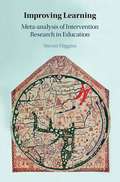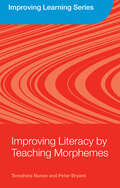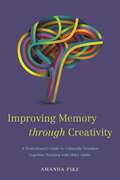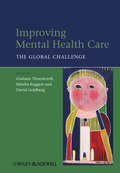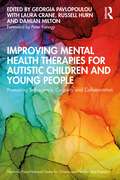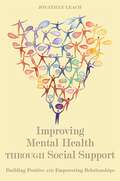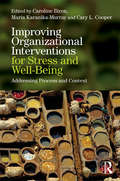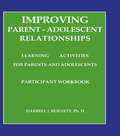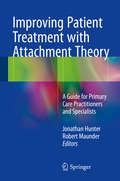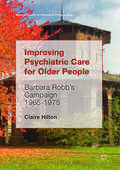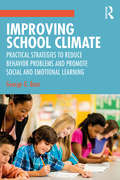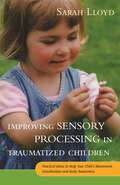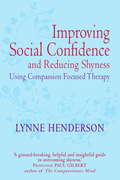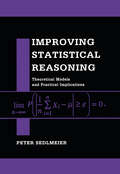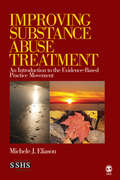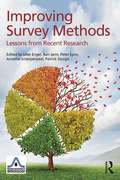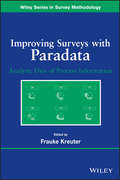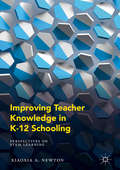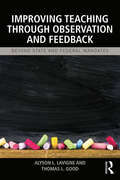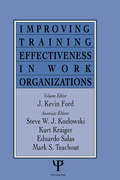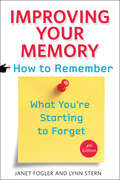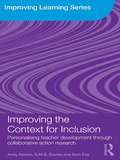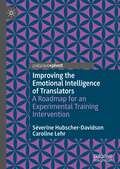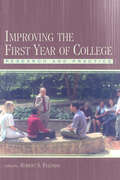- Table View
- List View
Improving Learning: Meta-analysis of Intervention Research in Education
by Professor Steven HigginsImproving Learning centres on the findings from different areas of education-focused research that support evidence-informed teaching and contextualises these results to optimise decision-making in schools. It also describes the origins and principles of meta-analysis in education and how this identifies the successes in improving learning in classrooms. Moreover, it explains the thinking behind the 'Teaching and Learning Toolkit' and similar approaches, which seek a big-picture overview of research findings. The advantages and disadvantages of this approach are explored with practical examples. Additionally, it identifies the issues in using research evidence in education and the steps that can be taken to improve this. It is not a manual on how to conduct a meta-analysis; instead the focus is on developing understanding of the approach in order to present its strengths and weaknesses. This understanding can advance critical engagement and effective use to improve educational outcomes for children and young people.
Improving Literacy by Teaching Morphemes (Improving Learning)
by Peter Bryant Terezinha NunesWith reports from several studies showing the benefits of teaching young children about morphemes, this book is essential reading for anyone concerned with helping children to read and write. By breaking words down into chunks of meaning that can be analyzed as complete units rather than as strings of individual letters, children are better able to make sense of the often contradictory spelling and reading rules of English. As a result, their enjoyment of learning about words increases, and their literacy skills improve. Written by leading researchers for trainee teachers, practising teachers and interested parents, this highly accessible and innovative book provides sound, evidence-based advice and materials that can be used to help teach children about morphemes, and highlights the beneficial effects of this approach.
Improving Memory through Creativity: A Professional's Guide to Culturally Sensitive Cognitive Training with Older Adults
by Amanda PikeCreativity stimulates older adults both mentally and emotionally and has numerous cognitive and social benefits. Providing culturally-sensitive strategies for improving memory through creativity, this timely book outlines innovative techniques and gives essential insight into effective clinical work in a world with an increasing number of diverse older adults and incidences of Alzheimer's disease. Amanda Alders Pike clearly explains how to structure sessions and use artistic creativity to improve memory, mood and socialization. She covers everything from how to introduce art materials and techniques, to how to enhance cross-cultural interaction. Graphs, charts, and tables illustrate how artistic creativity can parallel cognitive training to provide optimal benefits to a wide audience of older adults, and accompanying online material is provided for use in sessions and workshops.
Improving Mental Health Care
by Mirella Ruggeri David Goldberg Graham ThornicroftWritten by many of the world's leading practitioners in the delivery of mental health care, this book clearly presents the results of scientific research about care and treatment for people with mental illness in community settings. The book presents clear accounts of what is known, extensively referenced, with critical appraisals of the strength of the evidence and the robustness of the conclusions that can be drawn. Improving Mental Health Care adds to our knowledge of the challenge and the solutions and stands to make a significant contribution to global mental health.
Improving Mental Health Therapies for Autistic Children and Young People: Promoting Self-agency, Curiosity and Collaboration (Anna Freud)
by Peter Fonagy Laura Crane Damian Milton Russell HurnThis unique, collaborative book, featuring contributions from autistic and non-autistic experts, presents cutting-edge thinking on mental health and service transformation in relation to autistic children and young people (CYP) and their families.Investigating how to implement collaborative approaches to supporting autistic CYP's mental health, this book considers ways for professionals to share power and co-design models of support, promoting self-agency and supportive environments for autistic acceptance and wellbeing. Each chapter includes reflections and vignettes from autistic CYP and allies, key questions and thinking points for readers to consider. The book also includes a link for an e-library with multimedia material with the top take aways for clinicians such as animations, flyers and recorded interviews.The book will be of immense interest to individuals working with autistic CYP and their families in mental health at any level.
Improving Mental Health through Social Support: Building Positive and Empowering Relationships
by Jonathan LeachSocial support is the everyday assistance offered by family, friends, neighbours and colleagues, as well as the foundations of support in a range of non-clinical settings, and plays a vital role in a person's mental health and wellbeing. This book examines the nature of social support and offers a practical approach to how it can be enhanced. Focusing on the relationships between service users and supporters , it examines service users' experiences of issues of identity, stigma, social exclusion and social networks. Individual chapters look in depth at how social support is enacted in close relationships, educational institutions and in the world of employment. The nature of 'community' is explored with particular reference to how service users can be supported into greater engagement with social networks. Demonstrating the importance of social perspectives on mental health, this book is essential reading for practitioners, students and educators in mental health, social and community work, community mental health nursing and occupational therapy.
Improving Organizational Interventions For Stress and Well-Being: Addressing Process and Context
by Cary L. Cooper Maria Karanika-Murray Caroline BironThis book brings together a number of experts in the field of organizational interventions for stress and well-being, and discusses the importance of process and context issues to the success or failure of such interventions. The book explores how context and process can be incorporated into program evaluation, providing examples of how this can be done, and offers insights that aim to improve working life. Although there is a substantial body of research supporting a causal relationship between working conditions and employee stress and well-being, information on how to develop effective strategies to reduce or eliminate psychosocial risks in the workplace is much more scarce, ambiguous and inconclusive. Indeed, researchers in this field have so far attempted to evaluate the effectiveness of organizational interventions to improve workers’ health and well-being, but little attention has been paid to the strategies and processes likely to enhance or undermine interventions. The focus of this volume will help to overcome this qualitative-quantitative divide. This book discusses conceptual developments, practical applications, and methodological issues in the field. As such it is suitable for students, practitioners and researchers in the fields of organizational psychology and clinical psychology, as well as human resources management, health & safety, medicine, occupational health, risk management and public health.
Improving Parent-Adolescent Relationships: Learning Activities For Parents and adolescents
by Darrell J. BurnettFirst published in 1992. Routledge is an imprint of Taylor & Francis, an informa company.
Improving Patient Treatment with Attachment Theory
by Robert Maunder Jonathan HunterThis book emphasizes interpersonal relationships as a frequently overlooked, yet crucial element in today's healthcare system and describes the utility of attachment theory in understanding and managing patients with medical and surgical illness. Sections on the fundamentals of attachment theory, specific patient populations, attachment-based interventions, and future directions comprehensively reflect our current knowledge. The summarized research demonstrates the value of attachment theory in approaching such common issues as non-adherence, strain in the healthcare worker-patient relationship, and somatoform complaints, as well as in modelling maladaptive stress responses and subsequent illness vulnerability. The contributing authors are internationally recognized researchers and teachers who have sought to make this volume accessible to anyone interested in using the positive aspects of interpersonal relationships to maximum advantage in the practice of healthcare.
Improving Psychiatric Care for Older People
by Claire HiltonThis book is open access under a CC BY 4. 0 license. This book tells the story of Barbara Robb and her pressure group, Aid for the Elderly in Government Institutions (AEGIS). In 1965, Barbara visited 73-year-old Amy Gibbs in a dilapidated and overcrowded National Health Service psychiatric hospital back-ward. She was so appalled by the low standards that she set out to make improvements. Barbara's book Sans Everything: A case to answer was publicly discredited by a complacent and self-righteous Ministry of Health. However, inspired by her work, staff in other hospitals 'whistle-blew' about events they witnessed, which corroborated her allegations. Barbara influenced government policy, to improve psychiatric care and health service complaints procedures, and to establish a hospitals' inspectorate and ombudsman. The book will appeal to campaigners, health and social care staff and others working with older people, and those with an interest in policy development in England, the 1960s, women's history and the history of psychiatry and nursing.
Improving School Climate: Practical Strategies to Reduce Behavior Problems and Promote Social and Emotional Learning
by George G. BearImproving School Climate provides evidence-based and practical strategies for cultivating a healthy school environment, while also avoiding behavior problems. The book is packed with strategies centered on key components and conditions for a positive school climate, such as positive teacher-student relationships, positive student-student relationships (including absence of bullying), supportive home-school relationships, student engagement, effective classroom management and school discipline, school safety, and student self-discipline. This text is an important inclusion for educators and school psychologists who prefer a structured, evidence-based, and practical approach for improving school climate, while also promoting students’ academic achievements, preventing behavior problems, and fostering students’ social and emotional competencies.
Improving Sensory Processing in Traumatized Children: Practical Ideas to Help Your Child's Movement, Coordination and Body Awareness
by Sarah LloydDoes your child struggle to know how their body is feeling? Do they find it hard to balance or feel uneasy when their feet leave the ground? Early trauma and neglect can have a profound effect upon a child's development. Sensory integration theory offers a way of understanding how the brain processes and stores movement experience, and how these experiences manifest at a physical and emotional level. This book explains how early movement experiences affect brain development and gives examples of how trauma can prevent basic sensory processing pathways from being correctly established. It shows how you can identify gaps in normal sensory development and offers ideas for how you can use physical activities to help build up the underdeveloped systems. Good bodily awareness forms the foundation of motor development as well as social and emotional skills and learning. This book will help your child to be more in tune with themselves and their bodies and feel more comfortable in their environment. Highly accessible with lots of practical tips and examples, this book is written for adoptive and foster parents, and will also be useful for social workers, fostering and adoption workers and those working in primary and early years educational settings.
Improving Social Confidence and Reducing Shyness Using Compassion Focused Therapy: Series editor, Paul Gilbert
by Lynne HendersonShyness can affect most of us to varying degrees, and tends to affect children more than adults as people tend to grow in confidence as they get older. It is therefore a universal emotion but in some people it is a more pronounced personality trait. Severe shyness is referred to as 'social anxiety disorder', however this self-help book is written for the people experiencing different degrees of shyness. Shyness has evolved as an emotion over thousands of years and can be helpful in some circumstances, however normal shyness can become chronic thanks to negative thoughts, avoidance and withdrawal. While shyness has its functions, it becomes a problem when it interferes with life goals, develops into social anxiety disorder or leads on to 'learned pessimism', mild depression and even 'learned helplessness'. This self-help book, based on the groundbreaking new Compassion Focused Therapy, sets out the background to shyness - its evolutionary functions, why it becomes chronic in some people, and sets out skills and exercises based on CFT to help the reader overcome problematic shyness.
Improving Social Confidence and Reducing Shyness Using Compassion Focused Therapy: Series editor, Paul Gilbert
by Lynne HendersonShyness can affect most of us to varying degrees, and tends to affect children more than adults as people tend to grow in confidence as they get older. It is therefore a universal emotion but in some people it is a more pronounced personality trait. Severe shyness is referred to as 'social anxiety disorder', however this self-help book is written for the people experiencing different degrees of shyness. Shyness has evolved as an emotion over thousands of years and can be helpful in some circumstances, however normal shyness can become chronic thanks to negative thoughts, avoidance and withdrawal. While shyness has its functions, it becomes a problem when it interferes with life goals, develops into social anxiety disorder or leads on to 'learned pessimism', mild depression and even 'learned helplessness'. This self-help book, based on the groundbreaking new Compassion Focused Therapy, sets out the background to shyness - its evolutionary functions, why it becomes chronic in some people, and sets out skills and exercises based on CFT to help the reader overcome problematic shyness.
Improving Statistical Reasoning: Theoretical Models and Practical Implications
by Peter SedlmeierThis book focuses on how statistical reasoning works and on training programs that can exploit people's natural cognitive capabilities to improve their statistical reasoning. Training programs that take into account findings from evolutionary psychology and instructional theory are shown to have substantially larger effects that are more stable over time than previous training regimens. The theoretical implications are traced in a neural network model of human performance on statistical reasoning problems. This book apppeals to judgment and decision making researchers and other cognitive scientists, as well as to teachers of statistics and probabilistic reasoning.
Improving Substance Abuse Treatment: An Introduction to the Evidence-Based Practice Movement
by Michele J. EliasonThis book is an attempt to bridge the gap between research on substance abuse treatment programs and what actually goes on in the field of substance abuse treatment. It is aimed at both the academic and practitioner market (as is Perkinson) and it clearly describes how to determine what evidence based practice is and it addresses some of the challenges that practioners and agency directors might face in implementing EBP. The book is well-written and highly practical. It contains two complete case studies that outline two examples of Evidence based practice which will be particularly useful in the course market.
Improving Survey Methods: Lessons from Recent Research (European Association of Methodology Series)
by Uwe Engel Ben Jann Peter Lynn Annette Scherpenzeel Patrick SturgisThis state-of-the-art volume provides insight into the recent developments in survey research. It covers topics like: survey modes and response effects, bio indicators and paradata, interviewer and survey error, mixed-mode panels, sensitive questions, conducting web surveys and access panels, coping with non-response, and handling missing data. The authors are leading scientists in the field, and discuss the latest methods and challenges with respect to these topics. Each of the book’s eight parts starts with a brief chapter that provides an historical context along with an overview of today’s most critical survey methods. Chapters in the sections focus on research applications in practice and discuss results from field studies. As such, the book will help researchers design surveys according to today’s best practices. The book’s website www.survey-methodology.de provides additional information, statistical analyses, tables and figures. An indispensable reference for practicing researchers and methodologists or any professional who uses surveys in their work, this book also serves as a supplement for graduate or upper level-undergraduate courses on survey methods taught in psychology, sociology, education, economics, and business. Although the book focuses on European findings, all of the research is discussed with reference to the entire survey-methodology area, including the US. As such, the insights in this book will apply to surveys conducted around the world.
Improving Surveys with Paradata
by Frauke KreuterExplore the practices and cutting-edge research on the new and exciting topic of paradataParadata are measurements related to the process of collecting survey data.Improving Surveys with Paradata: Analytic Uses of Process Information is the most accessible and comprehensive contribution to this up-and-coming area in survey methodology.Featuring contributions from leading experts in the field, Improving Surveys with Paradata: Analytic Uses of Process Information introduces and reviews issues involved in the collection and analysis of paradata. The book presents readers with an overview of the indispensable techniques and new, innovative research on improving survey quality and total survey error. Along with several case studies, topics include:Using paradata to monitor fieldwork activity in face-to-face, telephone, and web surveysGuiding intervention decisions during data collectionAnalysis of measurement, nonresponse, and coverage error via paradataProviding a practical, encompassing guide to the subject of paradata, the book is aimed at both producers and users of survey data. Improving Surveys with Paradata: Analytic Uses of Process The book also serves as an excellent resource for courses on data collection, survey methodology, and nonresponse and measurement error.
Improving Teacher Knowledge in K-12 Schooling: Perspectives On Stem Learning
by Xiaoxia A. NewtonThis volume examines how several key components of the mathematics education system in the United States fail to provide teachers with adequate and effective tools to teach mathematics in K-12 classrooms. These components consist of teachers’ own learning experiences as students in K-12 classrooms, their undergraduate or graduate trainings in mathematics, and their in-service professional development trainings. Newton argues that unless we improve these system components as a whole and recognize the importance of teaching future mathematics teachers explicitly and rigorously the topics they are expected to teach, teachers will continue to recycle a body of incoherent and incomprehensible mathematical knowledge to their students, because these are the only types of mathematical knowledge they have at their disposal, both in terms of what they themselves have learned as K-12 students and in terms of the mathematical resources available to them, including the textbooks they rely on to teach as mathematics teachers.
Improving Teaching through Observation and Feedback: Beyond State and Federal Mandates
by Alyson L. Lavigne Thomas L GoodIn response to Race to the Top, schools nationwide are rapidly overhauling their teacher evaluation processes. Often forced to develop and implement these programs without adequate extra-institutional support or relevant experience, already-taxed administrators need accessible and practical resources. Improving Teaching through Observation and Feedback brings cutting-edge research and years of practical experience directly to those who need them. In five concise chapters, Thomas Good and Alyson Lavigne briefly outline the history of RttT and then move quickly and authoritatively to a discussion of best practices. This book is a perfect resource for administrators reworking their processes for new evaluation guidelines.
Improving Training Effectiveness in Work Organizations (Applied Psychology Series)
by J. Kevin Ford Eduardo Salas Kurt Kraiger Steve W. J. Kozlowski Mark S. TeachoutThis compelling volume presents the work of innovative researchers dealing with current issues in training and training effectiveness in work organizations. Each chapter provides an integrative summary of a research area with the goal of developing a specific research agenda that will not only stimulate thinking in the training field but also direct future research. By concentrating on new ideas and critical methodological and measurement issues rather than summarizing existing literature, the volume offers definitive suggestions for advancing the effectiveness of the training field. Its chapters focus on emerging issues in training that have important implications for improving both training design and efficacy. They discuss various levels of analysis-- intra-individual, inter-individual, team, and organizational issues--and the factors relevant to achieving a better understanding of training effectiveness from these different perspectives. This type of coverage provides a theoretically driven scientist/practitioner orientation to the book.
Improving Your Memory: How to Remember What You're Starting to Forget
by Janet Fogler Lynn SternAn essential handbook packed with proven techniques for remembering what you don’t want to forget.In the years since the previous edition of Improving Your Memory was published, technology has dramatically changed how we keep track of life’s many details. Appliances and car lights turn themselves off, smartphones and computers remind us of appointments, and Google lets us search for the information that we can’t remember. Still, we grow frustrated and anxious when words won’t come, when we misplace items, or when we forget meetings, birthdays, names. University of Michigan social workers Janet Fogler and Lynn Stern have completely updated their friendly and usable guide to memory improvement techniques. Recognizing that people worry something is wrong with them when they forget things, Fogler and Stern suggest that the antidote to worry is taking positive actions to help us remember what we want to remember. They provide readers with tools for understanding and improving memory, including sixteen helpful exercises. Simple techniques like writing information down, creating a catch word or phrase, altering something in your environment, and reviewing details in advance can put you actively in charge of retrieving information more easily. As in previous editions, Improving Your Memory reinforces memory techniques through real-life examples. This accessible handbook also discusses how memory works; how it changes with age, stress, illness, and depression; and why people remember what they do. Many readers will see immediate improvement in their memory after reading the book.
Improving the Context for Inclusion: Personalising Teacher Development through Collaborative Action Research (Improving Learning)
by Sam Fox Andy Howes S.M.B. DaviesThis timely book addresses the need for increasing multi-agency capacity in schools, as the success of initiatives such as ‘Every Child Matters’ or ‘personalised learning’ depends on teachers understanding the challenges faced by young people in learning effectively and happily in their school. The authors of this thought-provoking book present and analyse case studies of collaborative action research, illustrating what is needed in practice for teachers to engage with inclusion for the benefit of their pupils and themselves. The essential elements of success with inclusion are revealed, including: the importance of identifying issues that teachers see as relevant; how teachers can achieve meaningful collaboration in addressing the issues; the necessity of paying careful attention to the consequences of the changes that they make; incorporating practical considerations such as critical support from outsiders; the role of facilitators such as educational psychologists in working with groups of teachers to support their development through action research; how to facilitate change through making use of resources that are already available in the education system. Improving the Context for Inclusion is fascinating reading for all students of education, especially those with an interest in inclusion. Teachers, school leaders and those working in education services will gain an invaluable insight in to how to create an inclusive school environment.
Improving the Emotional Intelligence of Translators: A Roadmap for an Experimental Training Intervention (Palgrave Studies in Translating and Interpreting)
by Séverine Hubscher-Davidson Caroline LehrThis book provides a unique roadmap for the design of an effective emotional intelligence (EI) intervention adapted to the needs of translators. Building on the growing interest in understanding the impact of translators’ emotions on their work, this book is the first to outline the key components of an 18-hour training intervention based on a sound theoretical basis and aiming to improve translators’ emotional competencies. Following a detailed review of the relevant literature in both translation studies and psychology, the book demonstrates the importance of soft skills for translators’ wellbeing, psychological health, and work performance. A number of important elements that need to be considered when designing an evidence-based intervention are discussed, such as appropriate safeguards, theory-based activities, psychometric measures, individual difference variables, and suitable coaching techniques. The book concludes with a discussion of other relevant aspects, such as the role of culture in EI interventions and promising areas for further study. It will appeal to students and scholars of translation studies, researchers interested in personality, occupational and developmental psychology, as well as professional translators and their representative bodies.
Improving the First Year of College: Research and Practice
by Robert S. FeldmanThe first year of college represents an enormous milestone in students' lives. Whether attending a four-year or two-year institution of higher education, living on campus or at home, or enrolled in a highly selective school or a college with an open-admissions policy, students are challenged in unique and demanding ways during their first year.Although many students rise to the challenges they face, for some the demands are too great. Retention rates beyond the first year are disappointing: one third of first-year students seriously consider leaving college during their first term, and ultimately one half of all students who start college complete it.What are the factors that impact students during their first year? How can the academic and social experiences of first-year students be optimized? What can we do to improve retention rates to maximize the number of students who complete college? Improving the First Year of College employs a variety of perspectives from leading researchers and student-service providers to address these questions and examine the first year of college.This volume also highlights the development of learning communities and coaching, as well as how technology impacts students' first year. Perhaps most important, the book provides examples of "best practices," as determined through research by leaders in the field, to permit educators to draw on their experiences.
